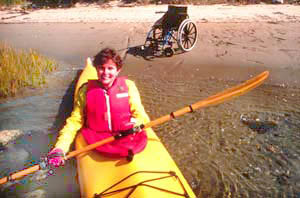USDA Forest Service Missoula Technology and Development Center Facilities Toolbox: Accessibility Tools
Disabled or handicapped or ??? Which terms should be used?
Though individuals who have disabilities use a variety of terms to refer to themselves, as an agency we must ensure that we use terminology that complies with legal direction and is considered acceptable by the majority of people. With these points in mind, the following guidance is offered.
The two terms most commonly used to describe a person who has a limitation are "handicapped" and "disabled."
A disability is the result of a medically definable condition that limits a person's movements, senses, or activities.

There is no "handicap" or "barrier" when this person with a disability is in her sea kayak.
A handicap is a barrier or circumstance that makes progress or success difficult, such as an impassable flight of stairs or a negative attitude toward a person who has a disability.
A practical example: Janet Zeller, who has quadriplegia (some level of paralysis in all four limbs), has been told that she doesn't look "handicapped" when she is out paddling her sea kayak. Think about the situation. When Janet is paddling her sea kayak she is part of a sleek craft gliding through the water. There are no barriers to stop her or to "handicap" her. But she still has a disability.
The correct term is "disability"—a person with a disability. Person-first terminology is used because the person is more important than his or her disability.
Examples of person-first terminology:
-
" the person who is blind"—not the blind person
-
" the person who uses a wheelchair"—not the wheelchair person.
It is also important to understand that there are negative connotations to the term "handicapped" when referring to a person who has a disability. The word has been around for centuries, but was not used to refer to people with disabilities until the late 1800s. Many people believe that the term "handicapped" was first used in relation to individuals who have disabilities when Civil War veterans whose injuries prevented them from working were begging on the streets with "cap in hand." Standard references do not support this story. But because the story has become legend and begging for a living is degrading, describing people with disabilities as "handicapped" is offensive.
In 1992, when Section 504 of the Rehabilitation Act was renewed and amended, one of the amendments was to correct terminology. Recognizing the negative impact of certain terms, the word "handicapped" was replaced with the phrase "persons with disabilities."
Also in 1992, Federal agencies were directed to correct terminology in their regulations, policies, and other documents. So when you participate in updating policies, the Forest Service Handbook or Manual, guidelines for the agency, direction to the field, or have input into other documents, please use the opportunity to correct the term "handicapped" and other references to persons with disabilities that do not place the person first.
Accessible means in compliance with the Federal accessibility guidelines and standards. Accessible sites and facilities do not contain barriers limiting their use by people with disabilities.
A site, facility, or program is accessible, or it is not accessible. The only way to evaluate accessibility is by using the legal standards and guidelines.
There are no shades of accessibility.
For instance, a parking space either meets the requirements and is accessible or it does not meet the requirements and is not accessible. The specific surfacing, slope, size, and walkway connection requirements must be met, regardless of the conditions around the parking space. "Almost" doesn't count.
If you have questions or concerns about this direction, or the use of other terms, please contact Janet Zeller, USDA Forest Service, Accessibility Program Manager, Recreation, Heritage, and Wilderness Resources staff in the Washington, DC, office. Her phone number is (202) 205-9597. Her e-mail is jzeller@fs.fed.us.

User Comments/Questions
Add Comment/Question